Sunday, September 9, 2007
Hijackers
 Five hijackers clockwise from top
Five hijackers clockwise from top1.Sunny Ahmed Kazi
2.Shahid Akhtar Sayed
3.Ibrahim Azhar
4.Mistri Zahur Ibrahim
5.Shakir
Nukkad -My experiences aboard IC-814
Burger
I |
'Clinton did what no indian minister bothered to do'
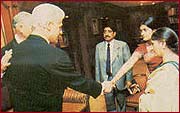
The Katyals with Bill Clinton
When the American Ambassador in India Richard Celeste contacted me on March 16 and told me that the President of the United States of America wants to meet Rachna, my wife Kusum and myself, I did not know what to say. We were still mourning the death of Rupin Katyal and here was an invitation from the most powerful man on earth to meet him.
Newly married, Rupin and Rachna were on a holiday to Nepal. They were returning to Delhi by Indian Airlines flight IC 814 when militants hijacked it. Rupin was the only passenger to be killed by the hijackers.
I consulted my wife and other members of the family and decided that we should meet President Bill Clinton and tell him about our feelings and the trauma that we had undergone in the last three and a half months. Over the next few days, we were in constant touch with Celeste and kept track of the developments.
Eventually, the meeting was fixed for March 21 at seven in the evening. In the morning, Ambassador Celeste called me up and told me that he would send a vehicle to pick us up for the meeting. I told him that there was no need for him to do that as Gurgaon was too far from the venue of the meeting. Instead, I asked them to pick me up from Hotel Radisson [near the Indira Gandhi International Airport].
Half an hour before the meeting, one Brian from the American embassy arrived to pick us up from the hotel. At the Maurya Sheraton, Richard Celeste received us at the porch. He took us to Chandragupta, the Presidential suite.
The meeting lasted precisely for fifteen minutes, from 7 to 7.15 pm. Clinton expressed his heartfelt condolences on the brutal death of Rupin. We were so touched by his kind gesture that we all broke down while narrating the sordid incident in which we lost our dear Rupin. President Clinton assured us that the American government would do everything in its power to ensure that the hijackers were brought to book and punished. He condemned terrorism and said that the killers of Rupin would not be spared.
We all told him in detail about the sufferings that we had undergone since we lost Rupin. Rachna told him how the hijackers kept her in the dark about the death of her husband. They told her time and again that he had been injured and was in a hospital in Dubai.
I had taken with me a book entitled The Inside Story and marked certain portions for his attention. In particular, I showed him the pages where the author had referred to my son. "My son kept on asking for water and they did not give him water. He cried, 'papa pani, papa pani'. Instead of giving him water, those brutes threw a blanket on his face." [Katyal breaks down as he narrates the story]
Clinton took the book and read the portions that I had highlighted. He was all attention as he listened to us. The meeting between Clinton and my family took place in a private room of his suite. I gave a photograph of my son Rupin to him. He wrote on it - 'With Respect and Regrets to Mrs Rachna Katyal, Chandermohan Katyal and Kusum Katyal'. He did not ask our names, nor did he misspell them. (Rachna has started working with Indian Airlines since March 1, 2000).
I drew his attention to the killing of 35 innocent Sikhs in the Kashmir Valley and asked him how long this madness would continue. He assured me that the American administration is doing everything it can to stop the killing of innocents. We have made news because Bill Clinton invited us to meet him. But after a few days, we would recede into the background and things would continue as normal. But we have lost our dear Rupin.
When he [Clinton] was talking to Rachna, she broke down and would just not stop weeping. He felt sorry for her. I know, whatever he said to us came from the bottom of his heart. Three and a half months after the tragedy, not even a single minister visited us to express his condolences. Clinton has done what others could not.
Rachna Katyal
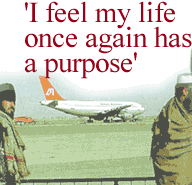
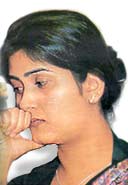
All through the eight-day ordeal, I had no idea that my husband had bled to death on the very first day of the hijacking. I must have gone into a state of shock. All I remember was that our family doctor came and I was administered sedatives. I had not seen Ripan since the first day of the hijack when the hijackers took Ripan and a few other male passengers from the economy class to the executive class. It is now a year since then. I have realised that life does not stop after the loss of a loved one. We who are living, Ripan's parents and I, have to go on.
Some time during that terrifying Christmas night, the 25-year-old honeymooner breathed his last...
On December 25, one day after Flight IC 814 was hijacked, a special IA relief aircraft brought 27 passengers -- including 13 women and 11 children -- and the body of Ripan Katyal who was killed by the hijackers, from Dubai. Civil Aviation Minister Sharad Yadav brought back the released passengers. Chaotic scenes were witnessed at the arrival terminal when the plane landed at 11 pm as relatives, friends and media persons jostled with the police and airlines personnel.
According to Captain D Sharan of IC 814, Ripan Katyal was stabbed because the hijackers were angry over the delay in refuelling the aircraft. Some time during that terrifying Christmas night, the 25-year-old honeymooner breathed his last under a blanket, purchased in Kathmandu by one of the passengers, which was thrown over Katyal's bleeding body. Till he was conscious, Ripan Katyal kept repeating, "Papa pani, Papa pani."
The brutally stabbed body of Ripan Katyal was carried in a wooden casket. According to the FIR report in Delhi, his body bore "one stab wound on the abdomen, four stab wounds on the chest, two stab wounds on the neck where the jugular vein was slit, six stab wounds on the face and one abrasion on the nose." Rachna, his young widow was still aboard the aircraft. It was only much later that Ripan's parents gave their daughter-in-law the tragic news.
What is the use of relieving those moments...
I would not like to talk about what happened to my life around this time last year. Virtually all the details have been well publicised in the media and, as for my personal loss and grief, I cannot describe it in words. Also, what is the use of reliving those moments?
I was brought up in Guhana, Sonepat, which is a small town in Haryana. I have two elder brothers but I am the only daughter. I spent most of my growing up years in a very protected environment with my parents and brothers. After I did my graduation from Rohtak University, my parents, like most parents in Indian society, decided to find a good match and get me married.
Since I was only 20 years old at the time, I did not particularly want to get married but I was not against it either. Whatever my parents decided was fine with me.
Since my parents were looking at an arranged marriage, they did see many suitable boys before finally deciding on Ripan Katyal. They chose Ripan because he was well-educated, intelligent and a very good-natured person and his parents too were cultured. Besides, they were a well-off and well-settled family. Since both sides were very satisfied with the match, the wedding was fixed without a hitch.
Why did it have to be Ripan, is the question which Ripan's parents and I are still asking...
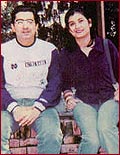 Ripan and Rachna in Kathmandu |
The wedding was a large family affair and both families did not spare any effort to see that everything went off well. It was only after all the ceremonies and rituals associated with the marriage were over that Ripan and I finally left for our fateful honeymoon to Kathmandu by the Indian Airlines flight.
Why did it have to be Ripan, is the question which Ripan's parents and I are still asking. My in-laws's main concern all along has been to protect me as much as they possibly can. They have taken no chances with me and, despite their grief, have done everything they can to prevent me from collapsing.
When I came back from Kandahar, my father-in-law was at the airport along with other family members to receive me, but he did not let his sorrow show. Whenever I asked about Ripan, they only told me that he was in hospital. They managed to take me home as quickly as possible so that the prying cameras of the media did not get to me. Even at home, the gates of the house were kept closed and media persons were requested to stay away.
I was told Ripan is no more only much later, after even the kriya ceremony had been performed. It was only when I repeatedly kept asking for Ripan and they could avoid it no longer that I was finally told the truth. I think I was becoming hysterical so my father-in-law finally pointed to a large photograph of Ripan and brokenly told me, "That is your Ripan. That is all that we have of him."
All through my eight-day ordeal, I had no idea that my husband had bled to death on the very first day of the hijacking. I must have gone into a state of shock. All I remember was that our family doctor came and I was administered sedatives. I had not seen Ripan since the first day of the hijack when the hijackers took Ripan and a few other male passengers from the economy class to the executive class.
My in-laws have accepted the fact that their son is no more and they have now devoted their life to my welfare...
It is now a year since then. I have realised that life does not stop after the loss of a loved one. We who are living, Ripan's parents and I, have to go on. My greatest support system and, in fact, the only reason why I am a normal person today is because of Ripan's parents.
Today they are dearer to me than anyone else and we have, in a way, come closer because of the immense tragedy we have shared. Our grief cannot be assuaged. My in-laws have accepted the fact that their son is no more and they have now devoted their life to my welfare. They say, "All we have is Rachna and she is our daughter now and we have to rebuild her life."
I was in no condition to take any decisions. Since I had been brought up in a small town and I was quite young (just 21 when I got married) my exposure to the outside world at that point was minimal. It was my father-in-law who, after discussing it with my mother-in-law, decided that I could not just spend the rest of my life in mourning.
He then decided the best thing I could do was to start working so that my mind would be diverted from my personal life. He approached Indian Airlines and asked them to consider employing me. Since we are a fairly affluent family there was absolutely no financial compulsion for me to work. But I am very glad that my father-in-law was wise enough to insist that I do something with my life. It has been just eight months since I started working and I think I am today a different person than I was on January 1, 2000.
However, my father-in-law is disappointed with the attitude of our government officials...
My father-in-law approached the Indian Airlines officials to absorb me in their organisation. The senior officials there had been extremely considerate all through that nightmarish period. In fact, I later learnt from my father-in-law that Sunil Arora, the present CMD of Indian Airlines, had kept vigil all night long with our family members when Ripan's body came back from Dubai.
Amongst those who were really concerned were Shekhar Ghose, HRD Director, Indian Airlines, and Minister for Civil Aviation Sharad Yadav and Chaman Lal Gupta. Even today Mr Gupta and Mr Arora are in touch with our family.
However, my father-in-law is disappointed with the attitude of our government officials. Nobody from the government, on behalf of the president, the prime minister or the external affairs ministry or the home ministry bothered to contact us or to represent the Indian government when Ripan's last rites were being done. This is something that we all, especially my father-in-law, feel let down about.
When Mr Chautala could attend the last rites on behalf of the Haryana government in Gurgaon (they have now even named a road in memory of Ripan as Shaheed Ripan Katyal Marg), why couldn't someone senior represent the government of India?
We all know nothing will bring Ripan back, but it would have helped to know that the government is serious about tracing the terrorists. What also hurts is the fact that those responsible for my husband's death have managed to get what they wanted, the release of the militants and they have all escaped unscathed.
We could not but feel the difference between their style of functioning and ours...
Initially, we did not really think about these things. But when we were called to meet the US President by Bill Clinton's staff and told that the US President wanted to meet us during his visit to India, we could not but feel the difference between their style of functioning and ours. No one from the Indian PMO's office had even bothered to send us a letter of condolence or called us but here was the US President asking us to personally meet him.
| |
Later he sent us a photograph and a letter from the White House assuring us that the government of the United States will work with India to find and prosecute those responsible for my husband's murder. Even now, nobody from the Indian government has updated us on the investigations or bothered to tell us whether our government is taking any action at the national or international level on this matter.
At no point ever did I wish to go back to my parents's house...
As I have already said, I have no need for any financial assistance. I have already received Rs 9,00,000 from Indian Airlines, which is the compensation decided under the Warsaw pact. My in-laws have given me emotional security and have opened their hearts and their home to me.
I still live with them in Gurgaon. At no point did I ever wish to go back to my parents's house. This is my home now and I am both son and daughter to my in-laws.
From March 1, I have been working as an office assistant in the HRD department in Indian Airlines at their headquarters, Airlines House, in Connaught Place, New Delhi. My father-in-law had made a special request that, since I had never worked before, I should be given an office job instead of a field posting where the hours may be erratic. The Indian Airlines authorities were kind enough to accommodate the request.
Even since I have started working, I feel I have changed immensely...
My in-laws are sparing no efforts to see that I lead a normal life like any other young girl of my age. My father-in-law has also persuaded me to continue my studies, so that I can have a bright future without being dependent on anybody.
I am now doing my MBA from IMT, Ghaziabad. I am continuing my studies along with my job. Since it is a correspondence course, I have to attend classes near my house in Gurgaon itself during the weekend when the office is shut.
Both mummy and papa (that is what I call Ripan's parents) want me to study as much as I can. Mummy takes care of all the household responsibilities so I don't have to worry about anything. I too am very keen to become a career person. Ever since I have started working, I feel I have changed immensely. I am much more confident and outgoing as a person. I feel my life once again has a purpose.
Before my marriage, I had never really thought of being a working girl. My in-laws too had never really wanted a working bahu. They just wanted a homely girl who could look after the needs of the family. But now that everything has changed so drastically, they have reoriented their thinking to whatever is best for me. They now feel, it is best that I have a career. I too want to rise high in my profession and want them to be proud of me.
Every question does not really have an answer...
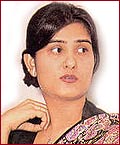 Rachna Katyal |
I feel if I hadn't started working, I would have just wasted away. I would have become a recluse, wallowed in self-pity and would have spent all my time wondering, why did this have to happen to me? Now I have a much more positive attitude to life and I have realised one has to accept life as it comes. Every question does not really have an answer. It is up to us to make the best of whatever circumstances one finds oneself in.
I feel I am still blessed because my in-laws have stood by me in adversity. Many girls in my circumstances would have returned to their parents' home but I have never, even for one day, felt the need. It is not as though my in-laws stopped me from going back to my parents. It was just that I never felt the need to, even for one moment.
Today, they need me just as I need them. We are each other's biggest solace. It's not just my in-laws, even Ripan's elder sister, Riru, who is married and now stays in the US, has accepted me as the daughter of this house. I know I have to rebuild my life but I will do it from here with the support and blessings of Ripan's family.
I can only wish other girls with my circumstances have such a support system and I would also ask every girl who is faced with a personal tragedy to go out and do something with her life. Unless you decide to help yourself, no one can do anything for you. Keep self-pity out of your life, look ahead and be strong enough to start life again.
My father-in-law's one wish is to see a scholarship instituted Ripan's memory. Indian Airlines is already working on a merit scholarship to be instituted in Ripan's name in the school he studied, which is the Rotary Public School in Gurgaon. If that is done, he will feel that his son's memory is still alive.